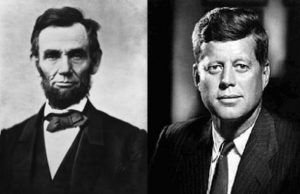Today is the 100th anniversary of John F. Kennedy’s birth. If you’re on social media, you might see a list of Lincoln and Kennedy “coincidences.” While some of them are true (like they both were elected in years ending with “60”) a lot are exaggerations, superficial or just plain wrong.
That said, there are some more interesting connections between the 16th and 35th presidents. Kennedy’s brother Robert owned a copy of the Emancipation Proclamation signed by Lincoln. Martin Luther King, Jr., presented JFK with the text of a “Second Emancipation Proclamation,” that would have outlawed segregation. In 1968, Dion recorded a song that combined all of these incredible people: “Abraham, Martin, and John” which focused on the assassination’s of Lincoln, King and the Kennedy brothers. Watch the YouTube video here: https://www.youtube.com/watch?v=a5hFMy4pTrs.
In addition, JFK cited Lincoln in a campaign speech while in Springfield, Illinois on October 3, 1960. It’s quite a striking speech that still echoes in the present.
He first mentioned Lincoln in the context of presidential debates, since just two days before he had met Nixon in the first televised presidential debate. Citing Lincoln’s famous line that the country couldn’t endure permanently half slave and half free, Kennedy stated that “today I am convinced that the basic issue which faces the American people and, indeed, the people of the world, is whether the world can exist half slave and half free, whether it will move in the next decade in the direction of freedom or whether it will move in the direction of slavery.”
But this speech was not just about coopting a famous Lincoln quote. Instead, Senator Kennedy invoked the legacy of Lincoln, even though he admitted that might be strange coming from a Democrat. “Some may say that a Democratic candidate for the Presidency has no right to invoke the name of Lincoln. I disagree. Abraham Lincoln belongs to the ages, and he belongs to all Americans, regardless of their party,” Kennedy said to great applause. He then proceeded to explain that outside of Lincoln, Republicans had no great president to refer to, since even Theodore Roosevelt left their party.
Later, he stated that the three best qualities of Lincoln’s presidency — leadership, courage, and foresight — would be the key qualities of the next president. Citing the example of Lincoln’s leadership, courage and foresight to sign the Emancipation Proclamation, on January 1 1863, Kennedy argued that this “Lincoln tradition” did not extend itself to someone who wants to limit the minimum wage, Federal aid to education, and medical care for the elderly — i.e. his opponent Richard Nixon.
Lastly, he quoted Lincoln’s last words upon leaving Springfield in 1861, and ended his speech by echoing words of the Gettysburg Address: “we come here tonight and dedicate ourselves to this country, dedicate ourselves to its future, dedicate ourselves to moving this country forward again.”
Read the entire speech here: http://www.presidency.ucsb.edu/ws/?pid=60377.

